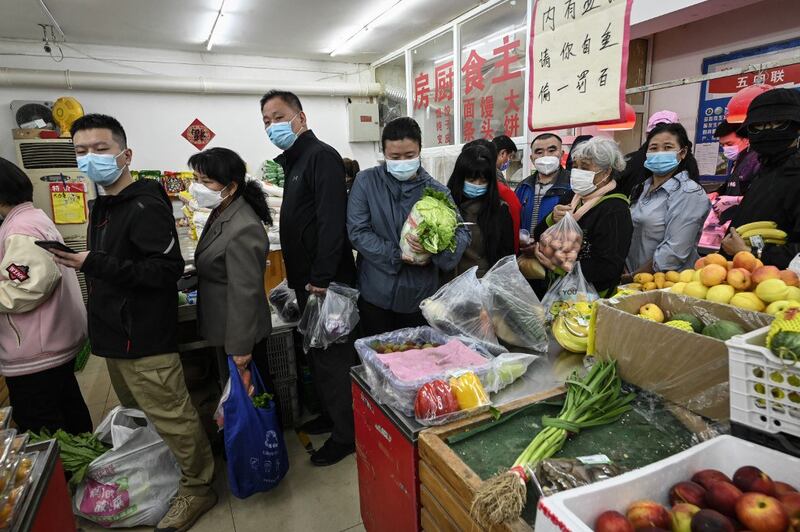China on Thursday announced it would place strict curbs on "non-essential" travel overseas by its nationals, amid a surge in immigration inquiries after weeks of grueling mass testing, lockdowns and forcible mass transportation to quarantine camps.
"On the afternoon of May 10, the National Immigration Administration [ruling Chinese Communist] Party committee held a meeting on strengthening disease control and prevention," the administration said via its Weibo account on Thursday.
"According to the requirements of the meeting ... it will be necessary to strictly implement entry and exit policies, strictly restrict non-essential departures of Chinese citizens, and strictly approve and issue exit and entry documents," it said.
Comments under the Weibo post were terse and sarcastic, yet with a hint of panic.
"Sure enough, disease control and prevention is a panacea," @Fangtou commented from Shanghai, while @HeyLucas123 added from Beijing: "They're afraid everyone will seek a happier life overseas."
User @Cucumber mixed with coriander 39466 added from Shanghai: "The front door is welded shut, don't even think about trying to run, just stay in China and have fun."
And @Libra zodiac sign added: "I feel more and more lately that the pandemic is just an excuse."
"We can't run away now! First they lock down the city, then the country. We're the last generation, and we get to watch everyone die!"
The news comes after police in the central province of Hunan ordered local residents to hand over their passports to police, promising to return them "when the pandemic is over."
A March 31 notice from the Baisha police department in the central province of Hunan posted to social media ordered employers to hand over the passports of all employees and family members to police, "to be returned after the pandemic."

Clipping passports at border
An officer who answered the phone at the Baisha police department confirmed the report to RFA, and said the measure is being rolled out nationwide.
Meanwhile, people leaving China for foreign study are having their passports clipped as they arrive or try to leave the country, according to passport-holders, overseas study agencies and social media reports.
China's zero-COVID policy of mass compulsory testing, stringent lockdowns and digital health codes has sparked an emigration wave fueled by "shocked" middle-classes fed up with food shortages, confinement at home, and amid broader safety concerns.
The number of keyword searches on social media platform WeChat and search engine Baidu for "criteria for emigrating to Canada" has skyrocketed by nearly 3,000 percent in the past month, with most queries clustered in cities and provinces under tough, zero-COVID restrictions, including Shanghai, Jiangsu, Guangdong, and Beijing.
Immigration consultancies have seen a huge spike in emigration inquiries in recent weeks, with clients looking to apply for overseas passports or green cards, while holding onto their Chinese passports, they said in April.
The immigration announcement also comes days after the CCP warned government officials in a May 5 communique that they should keep implementing CCP leader Xi Jinping's zero-COVID policy, which has prompted mass lockdowns involving tens of millions of people, stringent controls on movement, mass compulsory PCR testing and the forcible transportation and mass incarceration of people across China in makeshift quarantine facilities.
Meanwhile Shanghai residents said they were continuing to resist mass testing and forcible quarantine as best they could, despite multiple videos showing officials in full PPE beating and dragging people who were unwilling to test or to go to a quarantine facility.
Residents have complained via social media video clips of being forced into quarantine even if their PCR test was negative, while officials have been shown apparently raiding people's food stores during forcible "disinfection" of their homes.
But video clips also showed municipal workers mowing grass and planting flowers on the streets, prompting speculation that a high-ranking official would soon arrive in the city to announce victory over the virus.
Officials being challenged
A Shanghai resident surnamed Xue said infection figures have plummeted in the past two days.
"Infection numbers have plummeted in the past couple of days due to political factors, after military orders were issued to every district," Xue said. "When the data matches the target, they can lift the lockdown."
"They said residents would be allowed to go outside for exercise today, but it's still not allowed," he said.
He said residents were starting to argue with officials who came to their door ordering them to do PCR tests.
"When the police come to their door, they are insisting that they tell them which laws and which part of that law they have violated," Xue said. "There are fewer and fewer people submitting to PCR testing in our residential community."
"They keep shouting at us through the loudspeakers about it, but nobody believes what they're saying; they don't listen to what the government says any more."
One social media video clip showed Wei Qin, a woman living in Jing'an district, arguing with police officers and demanding to see the correct legal documents.
"You have already broken the law, and you're still arguing about it," Wei tells the officer. "I'm not breaking the law."
Another Shanghai resident surnamed Xu said the city authorities had stepped up restrictions in the wake of the directive from Beijing, banning any incoming deliveries and leaving some people without access to food.
"I'm eating the food that I bought before [the new restrictions]," Xu told RFA. "I was getting it through group buying."
Meanwhile, People's Daily journalist Li Hongbing hit out at video of officials forcibly entering people's homes for "disinfection" purposes.
"Home is a very private place, and I can understand this feeling [of resistance," Li told a Shanghai broadcaster. "I noticed that some residents are very concerned about this household disinfection process."
Li cited epidemiologists as saying that the risk of COVID-19 being transmitted via surfaces was "relatively small," meaning the disinfection of people's homes was unnecessary.
Translated and edited by Luisetta Mudie.
